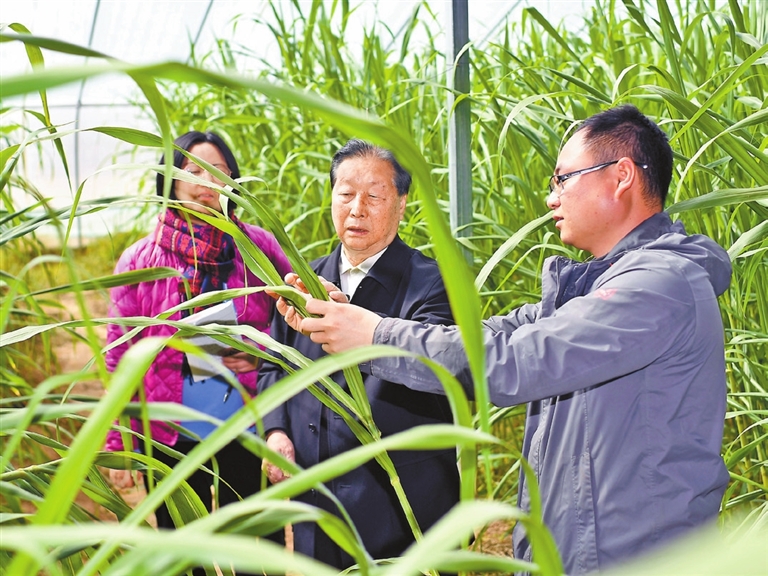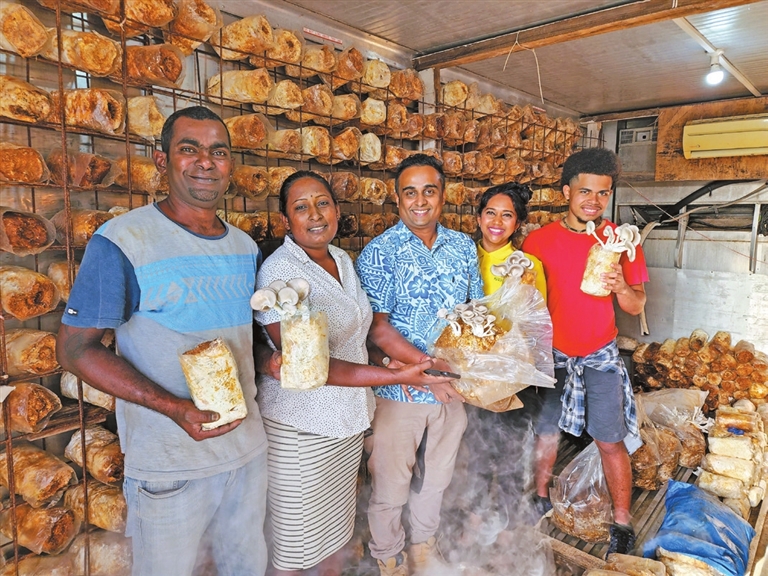

AN official from Papua New Guinea has named his daughter after China’s juncao to commemorate China’s assistance, said Lin Zhanxi, a delegate to the 20th National Congress of the Communist Party of China, in Beijing last week. Juncao, which literally means mushroom and grass, was cultivated by Lin in the 1980s. He is chief scientist of the National Juncao Technology Research Center and a professor at Fujian Agriculture and Forestry University. The hybrid grass is an important multi-functional agricultural resource. Its leaves, stems and roots can be used for ecological management, such as soil erosion control and desertification prevention. In the 1980s, Lin decided to experiment with using grass instead of logs to grow mushrooms because timber was not readily available for many rural households. In 1986, he succeeded, and his method was adopted by 51 counties in Fujian. In 1997, Lin brought six boxes of grass seeds to Ningxia after juncao was made one of the key projects in the pairing-off cooperation between Fujian and Ningxia. Lin said he was shocked by the poverty he witnessed. “It was barren, like the Sahara,” he recalled. Lin encouraged farmers to use them for growing mushrooms and later helped them sell their crops to other areas. The project increased the farmers annual income by 4,000 yuan (US$620) to 7,000 yuan that year. Twenty years on, the program remains one of the most successful of all pairing-off projects between the two regions, with over 20,000 rural households in Ningxia still devoted to mushroom cultivation, bringing in an average income of about 10,000 yuan per year. Thanks to its success, juncao was promoted in 506 counties across China and introduced to 106 countries around the world, including the South Pacific region, South America and Africa, contributing to global poverty reduction, said Lin. What impressed Lin most during his journey to help foreign countries develop juncao technology was his first station in the Eastern Highlands Province of Papua. Lin and his team arrived there over 20 years ago and solved a series of problems to localize and simplify juncao technology, which proved to be a great success there. “Local officials and over 5,000 people from across the country participated in a celebration rally. People sang and danced, shouting ‘China juncao’ and ‘Juncao China,’” said Lin. “So far, we have trained more than 12,000 technical personnel of the juncao technology for developing countries and trained 24 foreign students who translated the technology into 18 languages,” Lin said. “We had been producing mushrooms by using sawdust, banana leaves, and other supplements which are very expensive. We are now in the process of adopting juncao grass as a substitute for sawdust,” said Bathsheba Mchuza, founder and sales officer of the Uyogaplus farm in Tanzania, in an earlier interview. “This technology involves production of grass and mushrooms. The juncao grass is very important in our country in eliminating challenges of shortage of fodder,” said Elly Ligate, an ecologist in Tanzania. “Mushroom is easy to grow, highly nutritious, with a high market value. The mushroom farming is more suitable for women as it entails less intensive labor and could provide a consistent source of income to support our families,” said Seruwaia Kabukabu, a female entrepreneur in Fiji. “Many people in Rwanda were not aware that mushroom farming is a profitable business that can help fight poverty,” said Emmanuel Ahimana, owner of a Rwandan company that applies China’s juncao technology. In 2017, China’s juncao technology was listed as a key project of the China-UN Peace and Development Fund. Lin’s quest to introduce farmers in Xihaigu in Ningxia, one of China’s least habitable areas, to cultivating edible fungi as a way to increase incomes and stabilize moving sand dunes at the same time, is portrayed in Chinese TV drama “Minnning Town,” which topped the weekly charts for Chinese-language TV series last year and has become a sensation for its vivid narration. “I was born in a poor, rural region, and I know exactly the hardships that farmers are going through. That’s why lifting them out of poverty has been a long-cherished wish,” he said. Even at 79, retirement is not a consideration for Lin. He is exploring the potential of juncao in animal husbandry, ecological restoration and the making of biological materials. (Xinhua, China Daily) | 
